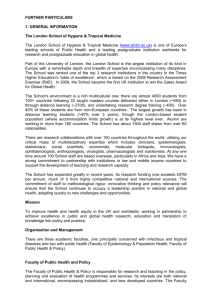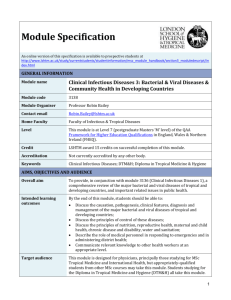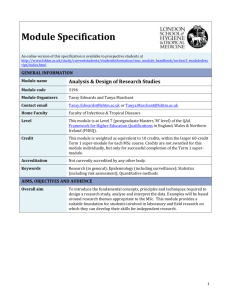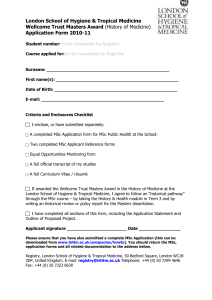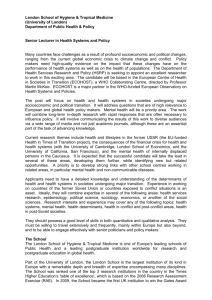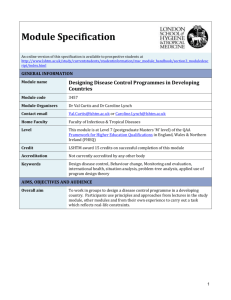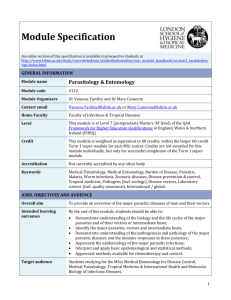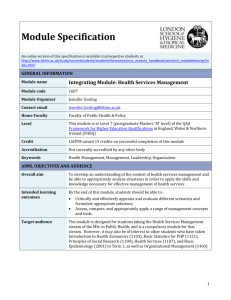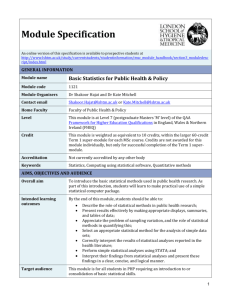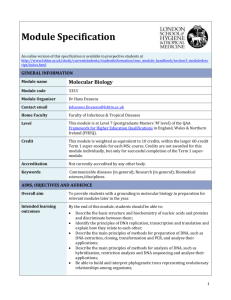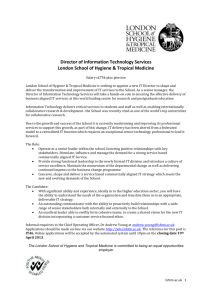3139 Clinical Infectious Diseases 4 Module Specification
advertisement
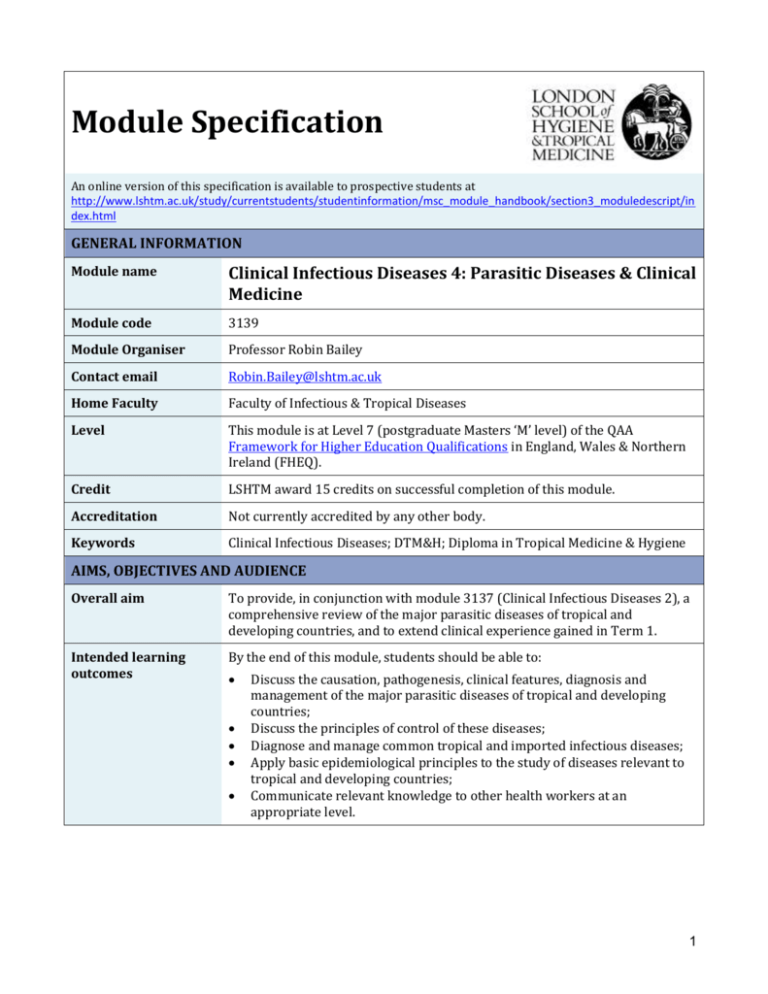
Module Specification An online version of this specification is available to prospective students at http://www.lshtm.ac.uk/study/currentstudents/studentinformation/msc_module_handbook/section3_moduledescript/in dex.html GENERAL INFORMATION Module name Clinical Infectious Diseases 4: Parasitic Diseases & Clinical Medicine Module code 3139 Module Organiser Professor Robin Bailey Contact email Robin.Bailey@lshtm.ac.uk Home Faculty Faculty of Infectious & Tropical Diseases Level This module is at Level 7 (postgraduate Masters ‘M’ level) of the QAA Framework for Higher Education Qualifications in England, Wales & Northern Ireland (FHEQ). Credit LSHTM award 15 credits on successful completion of this module. Accreditation Not currently accredited by any other body. Keywords Clinical Infectious Diseases; DTM&H; Diploma in Tropical Medicine & Hygiene AIMS, OBJECTIVES AND AUDIENCE Overall aim To provide, in conjunction with module 3137 (Clinical Infectious Diseases 2), a comprehensive review of the major parasitic diseases of tropical and developing countries, and to extend clinical experience gained in Term 1. Intended learning outcomes By the end of this module, students should be able to: Discuss the causation, pathogenesis, clinical features, diagnosis and management of the major parasitic diseases of tropical and developing countries; Discuss the principles of control of these diseases; Diagnose and manage common tropical and imported infectious diseases; Apply basic epidemiological principles to the study of diseases relevant to tropical and developing countries; Communicate relevant knowledge to other health workers at an appropriate level. 1 Target audience This module is designed for physicians, principally those studying for MSc Tropical Medicine and International Health, but appropriately-qualified students from other MSc courses may take this module. Students studying for the Diploma in Tropical Medicine and Hygiene (DTM&H) all take this module. Students who have taken Parasitology and Entomology (module 3122) in term 1 will notice some duplication in the lecture content. MSc TMIH students will notice some duplication in epidemiology teaching. CONTENT Session content The module is expected to include sessions addressing the following topics (though please note that these may be subject to change): Parasitic diseases; Managing clinical problems in low-income settings; Managing clinical problems where more expensive investigations and drugs are available. TEACHING, LEARNING AND ASSESSMENT Study resources provided or required Comprehensive handouts will be provided. Teaching and learning methods Key subjects are presented in half or whole day seminars. Most of these comprise presentations by experts in the field, followed by discussion. Each session is chaired by an experienced clinician/teacher. Clinical teaching sessions include bedside teaching, problem-based discussions in groups, and attendance at ground rounds. Basic epidemiology is taught by means of exercises carried out in small groups. Assessment details Assessments for modules 3136, 3137, 3138 and 3139 are co-ordinated and the nature of the specific assessment(s) for each module will be announced during the first week. Assessment methods will be of various types and may include individual tasks (such as essays, posters or presentations), structured tasks (for example an unseen written exam), collective tasks (groupwork), or a combination of the above. For students who are required to re-sit, or granted a deferral or new attempt, the task will be on a topic related to the subject area from the original assessment. The assignment may be an essay, or another type of assessed task, which must be completed within 1 week of release. This will be unsupervised and will be judged on the same criteria as in original assessment. Assessment dates Assessments will take place or be due on a date notified by the Module Organiser. For students who are required to re-sit, or granted a deferral or new attempt, the re-sit date will be the standard School-recommended date in mid/late September 2016. Language of study and assessment English (please see ‘English language requirements’ below regarding the standard required for entry). 2 TIMING AND MODE OF STUDY Duration The module runs for 5 weeks at 2.5 days per week from Wednesday lunchtime until Friday afternoon. Dates For 2015-16, the module will start on Wednesday 24 February 2016 and finish on Friday 25 March 2016. Timetable slot The module runs in LSHTM timetable slot D2. Mode of Study The module is taught face-to-face in London. Both full-time and part-time students follow the same schedule. For full-time students, other LSHTM modules are available in the other half of the week for the C and D slots. Learning time The notional learning time for the module totals 150 hours, consisting of: Contact time ≈ 30 hours Directed self-study ≈ 20 hours Self-directed learning ≈ 60 hours Assessment, review and revision ≈ 40 hours. APPLICATION, ADMISSION AND FEES Pre-requisites This module is only open to fully-qualified physicians English language requirements A strong command of the English language is necessary to benefit from studying the module. Applicants whose first language is not English or whose prior university studies have not been conducted wholly in English must fulfil LSHTM’s English language requirements, with an acceptable score in an approved test taken in the two years prior to entry. Applicants may be asked to take a test even if the standard conditions have been met. Student numbers Student numbers are typically 5 per year; numbers may be capped due to limitations in facilities or staffing. Student selection Access to this module reflects the entry criteria for the MSc Tropical Medicine & International Health and Diploma in Tropical Medicine & Hygiene courses and students must therefore be registered medical practitioners. Preference will be given to LSHTM MSc students particularly those registered for specific courses or who have taken specific prior modules, where applicable, and LSHTM research degree students (who must all be fully qualified physicians). Other applicants meeting the entry criteria will usually be offered a place in the order applications are received, until any cap on numbers is reached. Applicants may be placed on a waiting list and given priority the next time the module is run. Full Registration (full participation) by LSHTM research degree students is required for this module. 3 Fees For registered LSHTM MSc students, fees for the module are included within MSc fees (given on individual course prospectus pages). If registering specifically for this module, as a stand-alone short course, individual module fees will apply. Tuition fees must be paid in full before commencing the module, or by any fee deadline set by the Registry. Scholarships Scholarships are not available for individual modules. Some potential sources of funding are detailed on the LSHTM website. Admission deadlines For 2015-16: For registered LSHTM MSc students, the module choice deadline (for Term 2 and 3 modules) is Friday 20 November 2015. If registering specifically for this module, applications may be made at any time but, as places are limited, applications ahead of the MSc deadline are strongly advised. All applications should be submitted at the latest 8 weeks prior to the start of the module. Formal registration will take place on the morning of the first day of the module. ABOUT THIS DOCUMENT This module specification applies for the academic year 2015-16. Last revised: 4 July 2014 by Robin Bailey. Minor amendments 20 July 15 SDB London School of Hygiene & Tropical Medicine, Keppel St., London WC1E 7HT. www.lshtm.ac.uk 4
